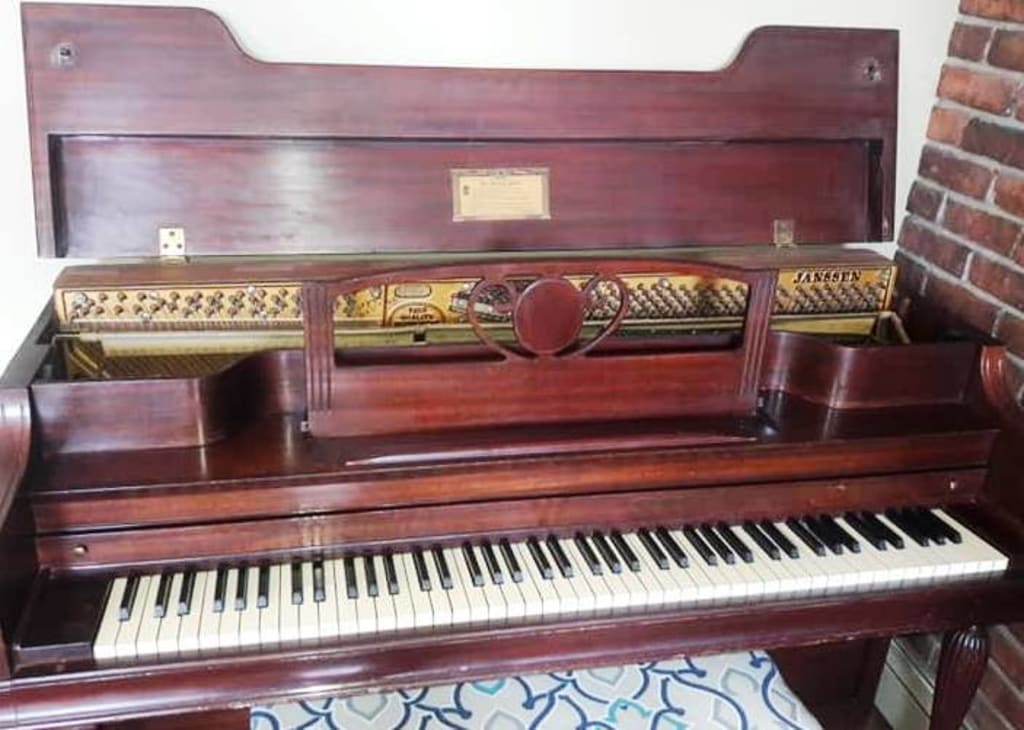Five Proven Health Benefits of Playing the Piano
Getting good is good for you.

American novelist Kurt Vonnegut loved music so much he once said: “If I should ever die, God forbid, let this be my epitaph—the only proof of God he needed was music.” While many of us perhaps feel this way, did you know there are proven health benefits of playing the piano? Yes! Tickling the ivories doesn’t only seduce your ears and fill your soul—playing music can improve memory, reduce stress, and encourage creativity! So maybe it’s time to free your inner Mozart?
Let’s take a look at five key benefits.
Reduce stress and anxiety.
Let’s face it, most of us have a hard time exhibiting what Hemingway called “grace under pressure.” If you’re like me, stress can grind you down, both the moment-to-moment stress of running late, misplacing your cell phone, looking for parking, and the long-term stress of bills and debts, your physical health, steering your kids through school, and their social lives…some of these problems can be solved, some can only be endured. This means there is stress you have to live with, but it doesn’t mean you have to suffer. The stress you experience from long-term challenges and struggles can actually be ameliorated with—you guessed it—piano lessons! A 2013 article from the National Library of Medicine found piano practice can actually relieve depression and alleviate stress in elderly adults. It doesn’t matter what age you are, losing yourself in music helps turn down the volume on your stress. Stress is a savage beast—learning to play an instrument can soothe it!
Strengthen the muscles in your hands and improve eye-hand coordination.
Kiss those hand grips goodbye and sit down at the piano if you want to improve your hand strength and your hand-eye coordination. Pianists, as well as guitar players and horn players, to say nothing of drummers, need strong, nimble fingers and flexible wrists. This hand strength will, of course, be helpful in other areas of your life, from cooking to typing to swimming to just about any sort of activity or project requiring hand strength. So will piano lessons help you chop onions faster and make you a better racquetball player? There’s only one way to find out.
Improve concentration, discipline and patience.
We can all benefit in improvement in this areas, I think. According to Australian academic and researcher Anita Collins, a number of areas of the brain “light up” when we play music. It seems the discipline of playing music is the equivalent of a full-body workout for your brain: play music and you strengthen multiple areas in your brain. Piano lessons, guitar lessons, saxophone lessons, xylophone lessons…playing music exercises your brain, ultimately providing long-term benefits such as improved concentration, better self-discipline, and even more patience. Who couldn’t use more patience? Playing piano also requires you to perform several actions simultaneously, which means as you become a more accomplished pianist, you’ll find you’re a more efficient multi-tasker!
Inspire creativity.
Just listening to music, particularly classical music, is associated with an increase in divergent thinking, a technique requiring the use of both hemispheres of your brain simultaneously, which is also described as creativity. According to a 2016 report funded by the Netherlands Organization for Scientific Research, listening to music may be useful to promote creative thinking in inexpensive and efficient ways in various scientific, educational and organizational settings when creative thinking is needed. What about playing music? A recent Vanderbilt University study reveals playing piano actually requires divergent thinking. And creativity isn’t just for artistic purposes—it’s about problem solving and appreciating the creativity of others.
Boost self-esteem.
For many of us, the more we accomplish, the better we feel about ourselves. Learning to play piano is a real challenge—it’s an enjoyable challenge, but a challenge nonetheless, and overcoming challenges is the quickest route to increased self-confidence and self-esteem. In 2014, a study examined fourth-grade public school students in Canada: those who had been given individual piano lessons tested higher on self-esteem measures (and school music achievement tests). When some of the things in our lives make us feel a bit blue and not so equipped to handle everything that comes your way, tickling the ivories might just increase your sense of competence and industry.
Getting Started
Okay, are you convinced? If the answer is yes (and how could it not be?), you might be a bit apprehensive about moving an entire piano into your apartment, house or trailer, but fear not! There are plenty of alternatives to a purchasing a $100,000 Steinway. There are plenty of digital alternatives available, all of them less expensive, much smaller, far more portable, and easier to learn on (with some you can simply connect to an iPad or tablet). And now’s the best time, with a free three-month trial membership from Skoove.com, a premier provider of interactive piano lessons for beginners and advanced players alike, when you purchase any digital piano, keyboard or MIDI controller from Amazon (restrictions apply). As Stevie Wonder sings, “Music is a world within itself, with a language we all understand.” A world awaits…
About the Creator
David Porter
David A. Porter has been the editor at large for Stereo Embers Magazine, an online music site, since 2007. David received an MFA in Creative Writing and an MA in English from San Francisco State University. He is a Rutgers graduate.






Comments
There are no comments for this story
Be the first to respond and start the conversation.